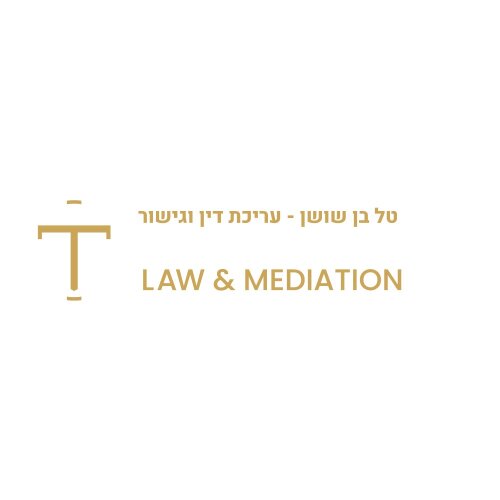Best Merger & Acquisition Lawyers in Rishon LeZiyyon
Share your needs with us, get contacted by law firms.
Free. Takes 2 min.
List of the best lawyers in Rishon LeZiyyon, Israel
About Merger & Acquisition Law in Rishon LeZiyyon, Israel
Merger & Acquisition (M&A) law in Rishon LeZiyyon, Israel, involves the legal framework governing the consolidation of companies or assets. M&A activities can include mergers, acquisitions, asset purchases, stock purchases, and management buyouts. The municipal regulations in Rishon LeZiyyon align with national Israeli laws, which focus on ensuring a fair and competitive market, protecting minority shareholders, and complying with antitrust regulations. Whether you're a business owner, investor, or legal professional, understanding M&A law is crucial for navigating these complex transactions successfully.
Why You May Need a Lawyer
There are several scenarios where legal assistance in M&A processes is vital:
1. **Complex Transactions**: M&A involves intricate legal and financial aspects that require expert handling to ensure compliance and successful closure.
2. **Due Diligence**: Lawyers conduct thorough due diligence to uncover potential risks and liabilities associated with a transaction.
3. **Negotiation and Drafting**: Skilled legal counsel is essential for negotiating terms and drafting agreements that protect your interests.
4. **Regulatory Compliance**: Ensuring that the deal complies with local and national regulations, including antitrust laws, which is pivotal in avoiding legal complications.
5. **Dispute Resolution**: Legal expertise is necessary for resolving disputes that may arise during or after the transaction.
6. **Confidentiality and Corporate Governance**: Lawyers help maintain confidentiality and advise on corporate governance issues to secure the transaction's integrity.
Local Laws Overview
The key aspects of local laws relevant to M&A in Rishon LeZiyyon include:
1. **Companies Law, 1999**: Governs the structuring, rights, and obligations of companies in Israel, including how they merge or acquire other businesses.
2. **Antitrust Law, 1988**: Ensures transactions do not create monopolies or reduce market competition. Transactions often require approval from the Israel Antitrust Authority.
3. **Securities Law, 1968**: Imposes disclosure requirements for publicly traded companies engaged in M&A activities.
4. **Contract Law**: Fundamental principles of contract law apply to all agreements and transactions made during the M&A process.
5. **Tax Implications**: M&A transactions may have significant tax consequences, and compliance with Israeli tax regulations is imperative.
Frequently Asked Questions
1. What is the difference between a merger and an acquisition?
A merger involves two companies combining to form a new entity, while an acquisition is when one company purchases another and absorbs its operations.
2. How long does the M&A process typically take?
The duration varies, but it can take anywhere from several months to over a year, depending on the complexity and size of the transaction.
3. Are there mandatory disclosures required during an M&A in Israel?
Yes, especially for publicly traded companies, mandatory disclosures are governed by the Securities Law, 1968.
4. What are the main steps in the M&A process?
The primary steps include planning, target search and screening, due diligence, negotiation, agreement, regulatory approval, and post-transaction integration.
5. Can foreign companies engage in M&A activities in Rishon LeZiyyon?
Yes, foreign companies can participate in M&A activities, but they must comply with Israeli laws and may require specific governmental approvals.
6. What role does an antitrust review play in an M&A transaction?
Antitrust reviews ensure the transaction does not negatively affect market competition. Approval from the Israel Antitrust Authority may be required for certain deals.
7. Are employee rights affected during an M&A transaction?
Employee rights are generally protected under Israeli labor laws, and any transfer of employment rights must comply with these regulations.
8. What is due diligence, and why is it important?
Due diligence is a comprehensive appraisal of a business conducted by a prospective buyer, assessing assets, liabilities, and risks. It is crucial for making informed decisions.
9. How are tax considerations handled in an M&A transaction?
Tax considerations are vital and complex. Legal and financial advisors ensure compliance with tax laws and optimize the tax outcomes of the transaction.
10. What happens if there is a dispute during the M&A process?
Disputes are typically resolved through negotiation, but they can also be escalated to arbitration or court if necessary, with legal representation essential for both parties.
Additional Resources
For more information and assistance, consider reaching out to:
1. **Israel Securities Authority (ISA)**: Regulates and oversees securities markets and M&A activities.
2. **Israel Antitrust Authority**: Ensures fair competition in the market and oversees antitrust approvals.
3. **Israel Tax Authority**: Provides guidance and regulations on tax implications for M&A transactions.
4. **Local Chambers of Commerce**: Offer support and resources for businesses engaged in M&A activities.
Next Steps
If you need legal assistance in an M&A transaction, follow these steps:
1. **Research and Identify Qualified Lawyers**: Seek lawyers with expertise in M&A law and a solid track record in Rishon LeZiyyon.
2. **Schedule Consultations**: Meet with potential lawyers to discuss your needs, understand their approach, and assess compatibility.
3. **Prepare Documentation**: Gather essential documents and information related to the transaction for review and discussion during consultations.
4. **Engage Legal Services**: Once you identify the right lawyer, engage their services to guide you through the M&A process, ensuring compliance and protecting your interests.
Lawzana helps you find the best lawyers and law firms in Rishon LeZiyyon through a curated and pre-screened list of qualified legal professionals. Our platform offers rankings and detailed profiles of attorneys and law firms, allowing you to compare based on practice areas, including Merger & Acquisition, experience, and client feedback.
Each profile includes a description of the firm's areas of practice, client reviews, team members and partners, year of establishment, spoken languages, office locations, contact information, social media presence, and any published articles or resources. Most firms on our platform speak English and are experienced in both local and international legal matters.
Get a quote from top-rated law firms in Rishon LeZiyyon, Israel — quickly, securely, and without unnecessary hassle.
Disclaimer:
The information provided on this page is for general informational purposes only and does not constitute legal advice. While we strive to ensure the accuracy and relevance of the content, legal information may change over time, and interpretations of the law can vary. You should always consult with a qualified legal professional for advice specific to your situation.
We disclaim all liability for actions taken or not taken based on the content of this page. If you believe any information is incorrect or outdated, please contact us, and we will review and update it where appropriate.










